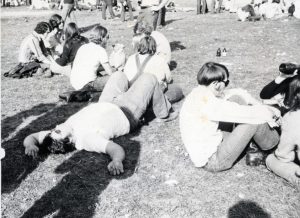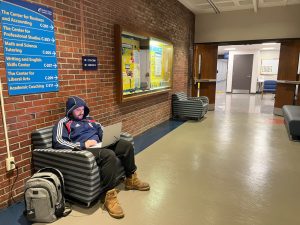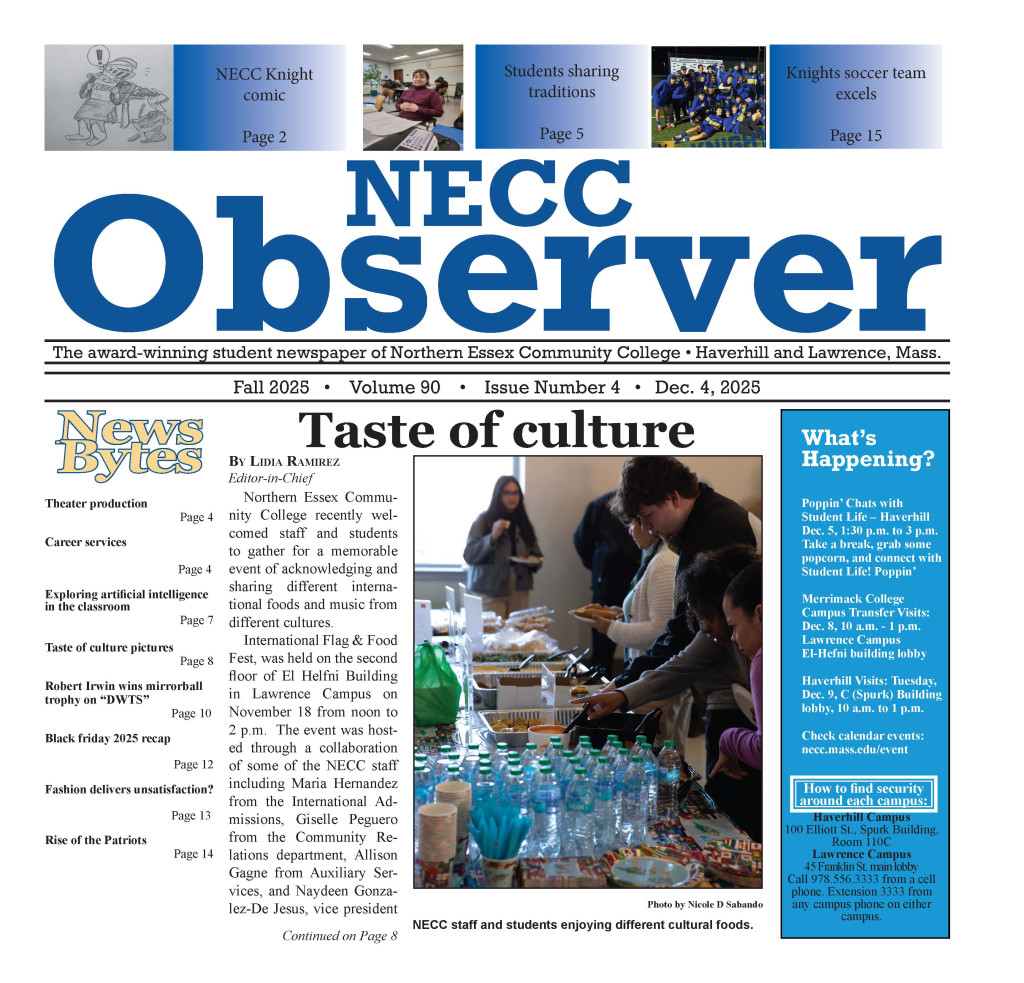Last edition of The Observer we got to hear what students think about campus life at Northern Essex Community College and how the broader effects of the pandemic and mass media have changed the social/emotional landscapes of their lives.
This edition we will hear from Rachel Dahill and her friend Serephine who tagged along for Rachel’s psychology class from outside of school and joined in on this interview.
Rachel Dahill is a 20-year-old psychology major at NECC and although she seemed a bit hesitant to a cold interview right off the cuff she quickly warmed up. She and her friend Serephine had some really interesting insights related to the pandemic and social media that is felt not only by students on campus but kids and young adults at large.
First, I wanted to get to know more about how Rebecca interacted with the campus space on a social level.
RD: “I’m friendly with people in my classes, my chemistry class is nice because we do a lot of labs and we’re always talking to each other. That’s the class I’ve made the most friends in.”
At a glance Rebecca seemed to be someone who could get along easily with most people so I wasn’t surprised she was friendly with some people on campus but how much did those connections impact the overall feeling of campus life at NECC.
RD: “No shade to the school but this isn’t anyone’s dream [school] if you’re coming out of high school you’re doing it so you can earn your credits to transfer to a four-year school and get your degree. If you’re transferring, maybe it’s because another school didn’t work out or you’re just midlife trying to get a degree.”
Rachel acutely echoed the sentiment that has been my finding as well.
We cannot try and delude ourselves with the reality of the community college campus by trying to hold it up next to a four-year school because that’s actually not the point. While NECC emphasizes your personal academic journey as a touchstone for success, the point of going to a four-year school is tied up in so much more than your education.
RD: “A lot of people see it [Community College] as a means to an end not their dream — when you’re freshly 18 and going to a four-year school you’re like, ‘I need to meet all of my friends for the rest of my life.”
At a place like NECC where there are no dorms or parties, the lack of social life feels like a setback in some ways. Although this naturally makes sense given the nature of the school it doesn’t account for what many others feel every day when they pass by one another in the halls.
In last edition’s Campus Life Section, Jordan Marcelin and Rhea Clarke both spoke about the social ripple of the pandemic and how the exponential rise in entertainment, social media and politics has created a new mentality. Although the benefits of the internet and social media promised us the most exciting upgrade in communication and connectivity it has paradoxically had the opposite effect. Many more people feel withdrawn and motivated to isolate themselves or avoid engagement with other people and the world around them.
The last few years of Gen Z (those born roughly between 1997-2012) and all incoming Gen Alpha (roughly 2012-2024) kids are subjected to this flavor of brave new world in a harsher way than any generation before. Having never experienced what came before it these age groups were the first guinea pigs subjected to the kind of internet culture we have today and have no experience from before it to fall back on. Rachel had this to say about it.
RD: “The pandemic really shifted people’s ability to make friends. Everyone finds chatting about their day strange, people before class are just sitting there on their phones not engaging.”
These kinds of thoughts and feelings seem to be prominent in the hearts and minds of today’s youth. Often when you talk to people in their late teens to mid 20s these feelings of sadness and isolation are underlined with detachment.
Maybe it’s a lack of proper education in our country or the oversaturation and stimulation of today’s media, news and politics but something has driven kids today to feel increasingly helpless and confused even though many of them are smart enough to recognize how they feel about it.
It’s akin to a neo-voyeurism that allows observation but is devoid of initiation which is often what lends credibility to the tropes of Gen Z being lazy and unmotivated.
Rebecca embodied this point by explaining how she herself knows how to talk the talk but rarely is able to walk the walk.
RD: “I’m part of the problem too, no one else wants to talk so I’m not going to be like the one, but I suppose I should.”
She goes on to contribute a wonderful analogy addressing the modern maladies of social isolation as it pertains to American individualism and social media.
RD: “With TikTok and everything, everyone wants to be their own cool person. Everyone wants to be nonchalant and act like they don’t care about anything. They think anyone engaging in something is weird and they’re trying too hard.”
Her friend Serephine weighed in as well.
S: “I think being the type of person to have your headphones on not paying attention to anyone, it’s very normalized now.”
RD: “Everyone because of TikTok thinks ‘ohh I’m the main character’ they want to be perceived as the cool person.”
S: “Once you change that mindset and you actually want to be nice to people, ask them how their day is, just being a decent human being, your life DOES get better, and your frontal lobe starts to develop.”
RD: “It’s cool to care.”
This “main character” concept that Rebecca mentions is a newer term that rationalizes the prioritization of yourself and your point of view as if you are the main character in the story of your life. A term popularly associated with this kind of lingo is the abbreviation NPC which in video games stands for “Non-Player Character”, a computer-generated character who exists with no sentient motivations within the game except what they are programmed to do by the computer. So this idea of main character energy- think Descartes with a god complex.
These concepts have gained steady appreciation as the idea of Simulation Theory becomes more commonly discussed. The Simulation Theory is exactly what it sounds like- the theory that we are living in a simulation.
As these ideas coalesce with the philosophy of American Individualism people are driven to increasingly view their lives as absurd games that they play from their own point of view, living in a world of “NPC’s” that you feel detached from because you cannot experience their emotions the way you can experience your own. The darkest fear this kind of thinking can have is opening the possibility that you, the main character, could in fact also be an NPC.
Another aspect we touched on in our conversation was how the combination of hyper individualism and social media have led us to curate our identities to a point that is impossible to recreate and maintain offline.
RD: “People need to get out of the mindset of it’s just me in my own world- because of TikTok and Instagram they curate their personality on that to be this very specific thing and only want to be perceived as being that kind of person when that’s not how life is- you’re going to be a different person in different environments. So they think because they’re this cool person online they need to emulate that but they’re just isolating themselves by not engaging in anything whether that’s the people or the world around them.”
Social media platforms give anyone the ability to curate their online identity but why are people motivated to only show certain aspects of themselves online that would otherwise be obvious IRL? If you remember the dawn of Facebook and Instagram it was rife with profiles that were so unbridled in their quirks that today they would be deemed very cringe. Certain angles of selfies and the “duck face” were commonplace attributes in many online profiles that have since disappeared. But why?
RD: “Everything’s recorded. If someone’s doing something out of the ordinary, they might be recorded which is also, like, a fear.”
“Today we’ve all heard crazy stories of parties in the 70s and 80s where they’re all doing crazy stuff and drugs and nowadays you never hear those stories cuz everyone has a little phone and is recording. Club life is dead for us 20 something year olds because everyone’s scared someone will record them doing something they don’t want to be put out there.”
What Rebecca suggests is fascinating. The beginning of social media occurred at a time where people were still adjusting to the world of mass surveillance whether that was illegal NSA spying programs or just someone with their phone in their pocket ready to whip it out at a moment’s notice.
Young Americans today are becoming increasingly reserved due to the exhausting awareness of how much and in what way other people may be observing them. Not only are they hyper aware of how others may perceive them, but they are also surrounded by constant mirrors and reflections making it harder and harder to be comfortable with yourself.
RD: “We see ourselves so much. Every single day we look in our camera, we look in a mirror, when originally you used to only see yourself in a pond’s reflection.”
“We are so hyper aware of everything we do, of exactly what we look like, exactly what we wear, what we sound like. That’s going to make you more narcissistic because you’re so aware of yourself.”
Maybe we could better untangle the philosophy of individualism and how it should be prioritized in society if the technology that we lose ourselves in everyday wasn’t also reinforcing our addiction to the release of dopamine.
I hope these excerpts and reflections from my conversation with Rebecca and Serephina motivate you to be more curious and vulnerable about the state of the world and our place in it but above all, what we can do about it. My personal belief is that it all starts with a conversation, so go out and have one!



